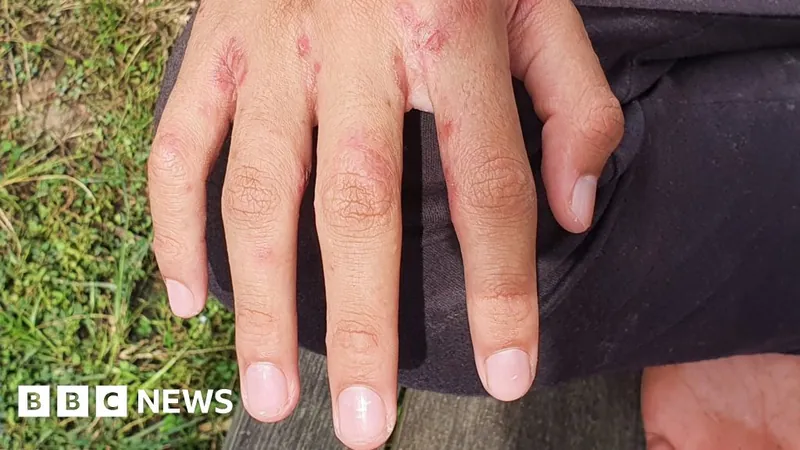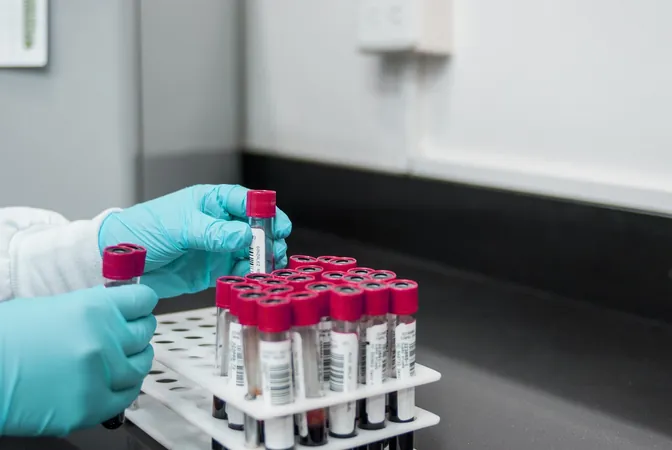
Scabies Surge: What You Need to Know and Why You Shouldn't Ignore That Rash!
2024-10-24
Author: Siti
In a shocking warning, General Practitioners (GPs) across England are urging individuals not to overlook an itchy rash, as scabies cases are rising alarmingly in the country.
This highly contagious skin condition is caused by microscopic mites that burrow beneath the skin to lay their eggs, leading to an incredibly itchy rash.
Scabies spreads easily, particularly in environments where people are in close quarters, such as universities, care homes, and crowded living conditions. According to the Royal College of GPs (RCGP), recent figures show that while overall cases of scabies remain relatively low, diagnoses have surged beyond the five-year average, especially in the northern regions of England.
Professor Kamila Hawthorne, the chairwoman of the RCGP, noted, "Despite being a manageable condition, scabies can cause severe discomfort and can lead to more serious complications if not treated promptly." These complications include secondary skin infections and exacerbation of pre-existing skin conditions, which can range from mild to severe.
The Disturbing Statistics: Scabies on the Rise!
NHS data indicates that there were 3,689 scabies diagnoses in hospitals across England in the past year, a dramatic jump from just 2,128 cases the previous year. This spike in scabies cases has prompted students from various universities to voice their concerns, with reports of multiple outbreaks occurring in shared accommodations. One student described the frightening experience of noticing "tiny red dots" spreading rapidly along his wrist.
"I found out one of my housemates had scabies, and that made me realize I probably had it too," he shared, highlighting the interconnected nature of outbreaks in shared living spaces.
Another student revealed a desperate struggle, stating he had been battling the condition for "two to three months." When asked how he might have contracted it, his candid response was, "Probably from a lot of sleeping together."
Professor Hawthorne emphasized the importance of seeking treatment despite the social stigma associated with scabies, stating, "Ignoring symptoms can worsen the situation and increase the risk of transmission to others."
Take Action: Treatment and Prevention
It’s crucial for anyone diagnosed with scabies—and their close contacts—to receive simultaneous treatment using topical creams or lotions readily available at pharmacies. Additionally, individuals should wash all bedding and clothing in hot water to help eliminate the mites.
Dr. Alison George, a GP who works in an emergency department in northern England, highlighted that students often arrive at A&E only after their scabies has escalated to a more severe state. "It can become quite nasty, and treatment becomes more complex if extensive areas of skin are affected," she warned.
Don't let embarrassment or stigma put you at risk! If you're experiencing an itchy rash or have been in close contact with someone diagnosed with scabies, it's time to take action. Seek medical advice, follow treatment regimens, and educate yourself on prevention to protect yourself and those around you from this unsettling and contagious condition.
Stay informed, stay healthy!



 Brasil (PT)
Brasil (PT)
 Canada (EN)
Canada (EN)
 Chile (ES)
Chile (ES)
 Česko (CS)
Česko (CS)
 대한민국 (KO)
대한민국 (KO)
 España (ES)
España (ES)
 France (FR)
France (FR)
 Hong Kong (EN)
Hong Kong (EN)
 Italia (IT)
Italia (IT)
 日本 (JA)
日本 (JA)
 Magyarország (HU)
Magyarország (HU)
 Norge (NO)
Norge (NO)
 Polska (PL)
Polska (PL)
 Schweiz (DE)
Schweiz (DE)
 Singapore (EN)
Singapore (EN)
 Sverige (SV)
Sverige (SV)
 Suomi (FI)
Suomi (FI)
 Türkiye (TR)
Türkiye (TR)
 الإمارات العربية المتحدة (AR)
الإمارات العربية المتحدة (AR)